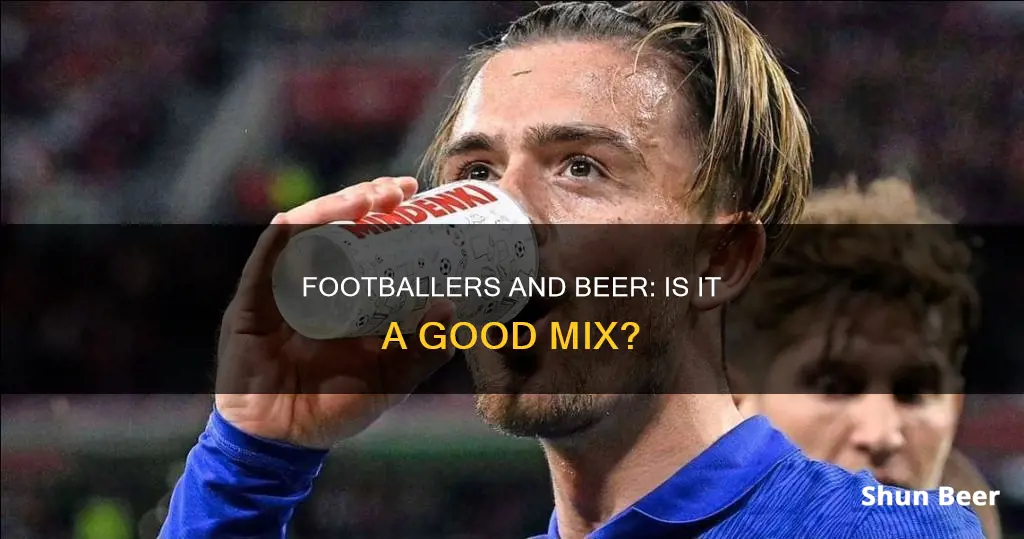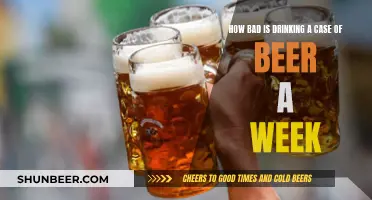
Alcohol has long been associated with football, with drinking cultures previously entrenched in the sport. However, the rise of foreign managers and an increased focus on health and fitness have contributed to a shift away from this tradition. While some footballers abstain from alcohol for religious or health reasons, others have struggled with alcohol abuse, leading to various issues, including crimes and health problems. The impact of alcohol on performance remains a subject of debate, with some arguing that moderate intake can have benefits, while others emphasise its negative effects on hydration, sleep, and neurological functions. Ultimately, the influence of alcohol on footballers encompasses a range of factors, from individual choices to cultural norms, and continues to be a topic of discussion within the sport.
| Characteristics | Values |
|---|---|
| Effects of alcohol on athletic performance | Dehydration, sleep deprivation, impaired thermoregulation, slower running speed, weight gain, impaired muscle recovery, disrupted sleep cycles, altered body temperature, aggravated snoring, negative impact on glycogen resynthesis, impaired balance, impaired reaction time, impaired visual search, impaired recognition, impaired memory, impaired accuracy of fine motor skills |
| Alcohol in football culture | Historically, English football had a drinking culture, exemplified by Arsenal's Tuesday Club. This declined from the late 1990s due to foreign managers and an increased focus on health and fitness. Notable players who abstain from alcohol include Cristiano Ronaldo, Gareth Bale, Jermain Defoe, Harry Kane, and Lou Macari. |
| Alcohol-related incidents in football | Some footballers have suffered from alcohol abuse, committed alcohol-related crimes, or died due to alcohol abuse. Alcohol-related crimes include violent crimes and drink-driving. Players who died due to chronic alcohol abuse include George Best and Garrincha. Players who have had long-term issues with alcohol include Tony Adams, Paul Merson, Paul Gascoigne, and Neil Ruddock. |
What You'll Learn

The impact of alcohol on athletic performance
Alcohol has been proven to have a negative impact on athletic performance. Research has shown that alcohol negatively affects the body's ability to recover, repair, and build muscle, as well as impairs thermoregulation, balance, reaction time, and visual search. In addition, alcohol is a diuretic, which can lead to dehydration and further impair performance. For these reasons, many athletes choose to abstain from alcohol completely during their season.
However, the effects of alcohol on performance are complex and depend on various factors such as the type and amount of alcohol consumed, the timing of consumption, and the individual's physiology. For example, some studies have shown that a small amount of alcohol consumed with a balanced meal is unlikely to have a significant negative impact on performance. Additionally, in moderate amounts, alcohol can have psychological benefits such as reducing anxiety and improving team bonding.
Historically, football had a drinking culture, with many players consuming large amounts of alcohol both before and after games. This culture has declined in recent years due to the efforts of foreign managers and a greater focus on health and fitness. However, alcohol continues to be a sponsor for major football teams and tournaments, and some players continue to consume alcohol, believing that it can have recreational benefits.
Ultimately, while moderate alcohol consumption may have some benefits for athletes, excessive drinking can ruin an athlete's career, health, and life. Abstinence is generally recommended for athletes who want to optimize their performance and maintain a lean body composition.
The Cost of Beer vs Mixed Drinks: Which is Cheaper?
You may want to see also

Alcohol-related crimes committed by footballers
Alcohol has been a significant issue in football, with some star footballers suffering from alcohol abuse up to the point of death, and others committing alcohol-related crimes. Here are some examples of alcohol-related crimes committed by footballers:
Violent Crimes
- Lee Bowyer, who played for Leeds United and Newcastle United, was convicted of violent crime after drinking alcohol and was sentenced to community service.
- Jordan Sinnott, a former footballer who played for Huddersfield Town and Altrincham, was left with a fractured skull after a "violent, drunken attack" in January 2020. Two men, Kai Denovan and Cameron Matthews, were jailed for manslaughter for their involvement in the attack.
- Adam Hammill, a former Barnsley and Liverpool winger, was convicted of common assault and battery in 2011 after an alcohol-fuelled incident outside a nightclub.
- Marlon King, a former Watford and Wigan striker, was convicted of assault and actual bodily harm in 2009 after an alcohol-fuelled incident.
Drink Driving
- Bobby Moore, the former England and West Ham United captain, was convicted of drink driving in 1974.
- Yaya Touré, a former Manchester City midfielder, was convicted of drink driving in 2016. He was found to be twice the legal limit and was banned from driving for 18 months.
- Wayne Rooney, a former Manchester United and England striker, was convicted of drink driving in 2017. He was found to be almost three times the legal limit and was given a two-year driving ban.
- Hugo Lloris, the Tottenham Hotspur and France goalkeeper, was convicted of drink driving in 2018. He was found to be over twice the legal limit and was fined and banned from driving for 20 months.
These examples demonstrate the negative impact that alcohol can have on footballers' lives and careers, leading to criminal convictions and, in some cases, tragic outcomes. It is important to note that alcohol abuse is a serious issue that can affect anyone, including professional athletes, and seeking help and support is crucial to address such issues.
Beer and Dieting: Can You Have Your Cake and Drink, Too?
You may want to see also

Alcohol consumption and health
Alcohol has been proven to have a negative impact on athletic performance. Alcohol is a diuretic and causes dehydration, which can increase the risk of muscle injuries. It also affects the body's ability to regulate temperature, which can be detrimental during physical activity, especially in extreme hot or cold conditions. In addition, alcohol impairs glycogen resynthesis, which hinders optimal muscle glycogen replenishment. Late-night partying that involves alcohol consumption can also lead to sleep deprivation and hangovers, negatively impacting performance the next day.
Research has shown that alcohol consumption can impair balance, reaction time, visual search, recognition, memory, and accuracy of fine motor skills. It can also slow down muscle repair, protein synthesis, and adaptation processes, hindering recovery. Alcohol stimulates the appetite, leading to excess calorie intake, and the additional calories can accumulate as body fat. Furthermore, alcohol provides fewer carbohydrates compared to other sources, and the calories from alcohol add up quickly.
The effects of alcohol consumption on performance vary depending on the type and dosage of alcohol, acute vs. chronic administration, and the elimination rate. While some argue that moderate intake may have some benefits, such as reducing pain and anxiety, alcohol has sadly ruined the careers, health, and lives of many athletes. It is essential for athletes to understand the negative consequences of alcohol consumption and make informed decisions regarding their health and performance.
It is worth noting that the drinking culture in English football has declined since the late 1990s due to the influence of foreign managers like Arsène Wenger and an increased focus on health and fitness. Some footballers abstain from alcohol for health, religious, or personal reasons. Notable teetotal footballers include Cristiano Ronaldo, Gareth Bale, Jermain Defoe, Harry Kane, and Lou Macari.
Root Beer's Soft Drink Status: What's the Verdict?
You may want to see also

Alcohol sponsorship in football
Historically, alcohol brands have had a significant presence in football, with sponsorships and advertising deals being a common occurrence. For example, English football clubs such as Liverpool, Newcastle United, and Everton have had well-known alcohol sponsors in the past. Liverpool was sponsored by Carlsberg from 1992 to 2010, Newcastle United by Scottish & Newcastle from 1980 to 2000, and Everton by Chang Beer from 2004 to 2017. These sponsorships often included shirt sponsorships, with alcohol brands prominently displayed on players' kits.
However, in recent years, there has been a shift away from alcohol sponsorships in football. By the 2017-18 season, there were no longer any alcohol sponsors on shirts in the Premier League, with gambling companies taking their place. This change can be attributed to several factors, including increasing criticism of the relationship between alcohol and sport, as well as a growing awareness of the negative health effects of alcohol consumption.
Additionally, some countries have implemented regulations and restrictions on alcohol sponsorships in sports. For instance, France passed the Loi Évin in 1991, making it illegal to use sponsorship to promote alcohol. As a result, visiting foreign teams must remove alcohol branding from their kits when playing in France. Other countries, such as Norway and Sweden, have also implemented statutory regulations on alcohol marketing, including sports sponsorships.
The impact of alcohol sponsorships in football has been mixed. On the one hand, these sponsorships provide significant financial support for teams and tournaments. On the other hand, there are concerns about the message it sends to fans, especially younger audiences, and the potential influence on alcohol consumption and abuse.
While the debate around alcohol sponsorship in football continues, there is a growing trend towards finding alternative sponsors and promoting a healthier image for the sport.
Is Day-Old Beer Safe to Drink?
You may want to see also

Famous footballers who abstain from alcohol
While football has long been associated with a drinking culture, some famous footballers choose to abstain from alcohol. This may be due to health and fitness reasons, religious beliefs, or simply personal preference. Here are some notable footballers who are known for abstaining from alcohol:
Cristiano Ronaldo
Considered one of the greatest footballers of all time, Cristiano Ronaldo is known for his dedication to health and fitness. He reportedly avoids alcohol, along with other substances, to maintain his athletic performance.
Gareth Bale
Gareth Bale, the Welsh forward who has played for Real Madrid and Tottenham Hotspur, is another footballer who abstains from alcohol. He is known for his disciplined lifestyle and focus on fitness, which has contributed to his success on the pitch.
Harry Kane
Harry Kane, the English striker who plays for Tottenham Hotspur and captains the England national team, is also known for his teetotalism. He has chosen to avoid alcohol, which may contribute to his exceptional goal-scoring record and consistent performances.
Jermain Defoe
Jermain Defoe, a former English striker who played for Tottenham Hotspur, Portsmouth, and the England national team, is another footballer who abstains from alcohol. Defoe has been open about his decision to avoid alcohol, which he believes helps maintain his health and performance.
Lou Macari
Lou Macari, a former Scottish footballer and manager, is also known for his abstinence from alcohol. Macari has been open about his decision to avoid alcohol and has even written a book titled "Football and Cider Don't Mix," sharing his experiences and insights.
These famous footballers have demonstrated that abstaining from alcohol is possible, even in an industry where drinking culture has been prevalent. Their dedication to health, fitness, and personal beliefs has contributed to their success and influenced a new generation of athletes.
Wisconsin Kids Drinking Beer: Consent and the Law
You may want to see also
Frequently asked questions
There is no rule prohibiting footballers from drinking beer. However, it is known to be detrimental to their performance and health.
Research has shown that alcohol negatively affects sleep quality, body temperature, and hydration. It also stimulates appetite, leading to excess calorie consumption, and slows down muscle repair and protein synthesis.
Yes, some footballers abstain from drinking alcohol for various reasons, including health, performance, and religious beliefs. Notable footballers who don't drink include Cristiano Ronaldo, Gareth Bale, Jermain Defoe, Harry Kane, and Lou Macari.







